

SPENT simulation of fliving at poverty level. Context & core. Geoffrey Moore at Business of Software. Video & transcript. Geoffrey Moore at Business of Software 2009.
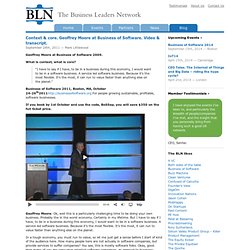
What is context, what is core? “I have to say if I have, to be in a business during this economy, I would want to be in a software business. A service led software business. Because it’s the most flexible. It’s the most, it can run to value faster than anything else on the planet.” Business of Software 2011, Boston, MA, October 24- For people growing sustainable, profitable, software businesses. If you book by 1st October and use the code, BoSSep, you will save $350 on the full ticket price. Geoffrey Moore: Ok, well this is a particularly challenging time to be doing your own business. In a tough economy, you must run to value, so let me just get a sense before I start of kind of the audience here. Good. So there’s two pieces, I want to talk to you about. Safe as Milk » Blog Archive » Humanitarian Software – Using technology to help humanity. September 22, 2011 2:37 pm Dave Neary community , freesoftware , marketing , work Tomorrow, Friday September 23rd, the Humanitarian FOSS track at the Open World Forum will bring together leaders from some of the most important humanitarian software projects and case studies of the impact these projects are having on people’s lives around the world.
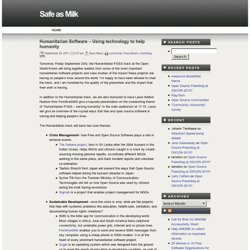
I’m happy to have been allowed to chair the track, and I am humbled by the quality of the presenters and the impact that their work is having. Whole System Conversations - and the Voice of the Whole - Tom-Atlee's posterous. Food+Tech Connect. Stowe Boyd on Hacking the Food System: Social Food- Taking Food Back From Corporations. [Hacking the Food System is an online conversation exploring how technology, information and data can change the food system status quo.
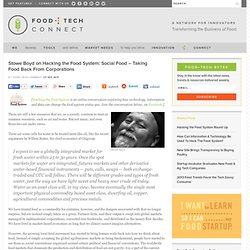
Join the conversation below, on Facebook.] Stowe Boyd There are still a few resources that we, as a society, continue to treat as common resources, such as air and water. But not many, and even those two are under stress. Stowe Boyd on Hacking the Food System: Social Food- Taking Food Back From Corporations. Book Review: The Price of Civilization - WSJ.com#articleTabs=article. Sachs: Corporatocracy is Replacing Democracy. How Cooperation Triumphs over Self-Interest. Jean Lievens has written an extensive synthesis of Yochai Benkler’s new book: * Book: The Penguin and the Leviathan.
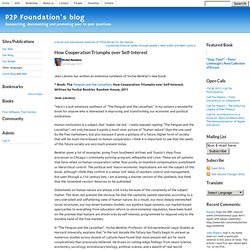
How Cooperation Triumphs over Self-Interest. Written by Yochai Benkler. Random House, 2011. The spiritual underpinnings of the Mondragon project. “Alongside profit-oriented private enterprise and the various types of public enterprise, there must be room for commercial entities based on mutualist principles and pursuing social ends to take root and express themselves.
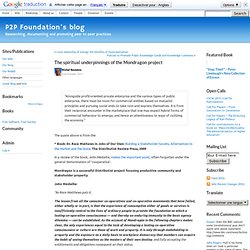
It is from their reciprocal encounter in the marketplace that one may expect hybrid forms of commercial behaviour to emerge, and hence an attentiveness to ways of civilizing the economy.” Policies to Promote Public Knowledge Goods and Knowledge Commons. Policies to Promote Public Knowledge Goods and Knowledge Commons Franco Iacomella 3rd October 2011 Article: AN INTEROPERABILITY PRINCIPLE FOR KNOWLEDGE CREATION AND GOVERNANCE: THE ROLE OF EMERGING INSTITUTIONS.
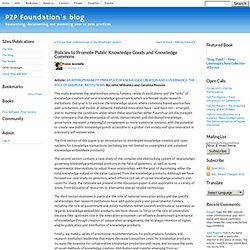
In Greece, Barter Networks Surge. American Academy of Actuaries: Contingencies Magazine home page. Fall of the Soviet Union: Implications for Today. Back in the 1960s and 1970s, the country that was the “big growth story” was the Soviet Union.
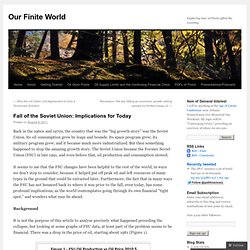
Its oil consumption grew by leaps and bounds. Its space program grew; its military program grew; and it became much more industrialized. But then something happened to stop the amazing growth story. The Soviet Union became the Former Soviet Union (FSU) in late 1991, and even before that, oil production and consumption slowed. European Debt Crisis and Sustainability.
What would humans have to do to really live sustainability with the world’s ecosystems?
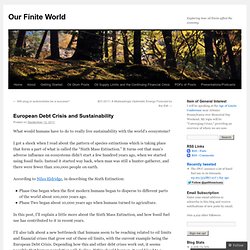
I got a shock when I read about the pattern of species extinctions which is taking place that form a part of what is called the “Sixth Mass Extinction.” It turns out that man’s adverse influence on ecosystems didn’t start a few hundred years ago, when we started using fossil fuels. Instead it started way back, when man was still a hunter-gatherer, and there were fewer than 100,000 people on earth.
According to Niles Eldridge, in describing the Sixth Extinction: Phase One began when the first modern humans began to disperse to different parts of the world about 100,000 years ago.Phase Two began about 10,000 years ago when humans turned to agriculture. In this post, I’ll explain a little more about the Sixth Mass Extinction, and how fossil fuel use has contributed to it in recent years. Robert H. Frank's The Darwin Economy, reviewed.
Charles Darwin, not Adam Smith, will one day be considered the father of economics, says Cornell University professor and New York Times columnist Robert H.
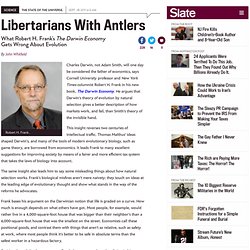
Frank in his new book, The Darwin Economy. He argues that Darwin's theory of evolution by natural selection gives a better description of how markets work, and fail, than Smith's theory of the invisible hand. This insight reverses two centuries of intellectual traffic. Thomas Malthus' ideas shaped Darwin's, and many of the tools of modern evolutionary biology, such as game theory, are borrowed from economics. It leads Frank to many excellent suggestions for improving society by means of a fairer and more efficient tax system that takes the laws of biology into account. Hilary Wainwright maps the new structures of feeling. Excerpted from Hilary Wainwright in Red Pepper.
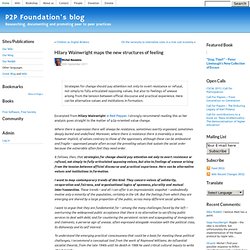
I strongly recommend reading this as her analysis goes straight to the matter of p2p-oriented value change. Where there is oppression there will always be resistance, sometimes overtly organised, sometimes deeply buried and undefined. Moreover, where there is resistance there is invariably a sense, however implicit, of values contrary to those of the oppressors, although these can be ambivalent and fragile – oppressed people often accept the prevailing values that sustain the social order because the vulnerable often feel they need order.
It follows, then, that strategies for change should pay attention not only to overt resistance or refusal, not simply to fully articulated opposing values, but also to feelings of unease arising from the tension between official discourse and practical experience. Here can be alternative values and institutions in formation. On the necessity to internalize costs in a true cost economy. An excerpt from chapter 10 of Sacred Economics: Charles Eistenstein: “Externalized costs are costs of production that someone else pays. For example, one reason vegetables from California’s Central Valley are cheaper to buy in Pennsylvania than local produce is that they don’t reflect their full cost. Since producers are not liable to pay the current and future costs of aquifer depletion, pesticide poisoning, soil salinization, and other effects of their farming methods, these costs do not contribute to the price of a head of lettuce.
Suburbia: Where the poor are. Here Comes The "China Hard Landing" - Full Bank Of America Presentation Slides. Earlier today Bank of America released a presentation and a conference call in which the firm's head of China equity strategy David Cui spoke about the dreaded "China Hard Landing" or the event that would kill all decoupling dreams for ever and ever, and probably lead to a world depression.
It seems that the latest down move in the market is being partially attributed to just this notification finally making the rounds as can be seen in the note below: "BofAML’s David Cui is the Markets’ #1 rated China Strategist according to the 2011 Institutional Investor All-China Survey. While he is not responsible for our China GDP forecast, he sees significant Chinese specific financial market risks that could trigger lower than expected Chinese growth. He sees that those financial market risks as having increased considerably. India's farmland size falls drastically, CII calls for model Leasing Act. The average size of agriculture land under cultivation in India has declined progressively from 2.63 hectares in 1996 to 1.06 hectares, creating serious problems in agriculture sector; Confederation of Indian Industry.. 28 Sep 2011 NEW DELHI (Commodity Online): The average size of agriculture land under cultivation in India has declined progressively from 2.63 hectares in 1996 to 1.06 hectares, creating serious problems in agriculture sector; Confederation of Indian Industry (CII) has proposed the India government to introduce a model land leasing Act to tackle the problem.
Drilling Down: Tainter and Patzek Tell the Energy-Complexity Story. Joseph Tainter and Tadeusz Patzek are authors of a soon-to-be-released book called Drilling Down: The Gulf Oil Debacle and Our Energy Dilemma. This book is part of Charles Hall’s Briefs in Energy series with the publisher Springer. An earlier book in this series was The Limits to Growth Revisited, by Ugo Bardi. Why do it yourself is also green. Sami Grover responds to the critique that the future won’t be handmade, by pointing out the benefits of knowledge that derive from individual or collective self-production: “Alex Steffen once declared that the revolution will not be handmade—but I’m thinking some of the equipment used in it may very well be.
Now I am, by far, one of the least practical people I know, but i do like to try my hand at some DIY projects from backyard beekeeping to home composting to brewing my own beer. Nevertheless, I’ve been challenged before about these habits—after all, what’s so green about doing things yourself? Wouldn’t it be better to employ the economies of scale and efficiencies inherent in larger-scale production? On the one hand, these detractors may have a point. But then there are huge opportunities for efficiency, recycling, and reuse too. Farmer to Farmer: The Truth About Gm Crops. From crowdsourcing to crime-sourcing: The rise of distributed criminality. The Local-global Flip, Or, "the Lanier Effect" Interview with Daron Acemoglu - The Region. Consensual Hallucination. When William Gibson coined the term cyberspace in 1984 in the book Neuromancer, he described it as “a consensual hallucination experienced daily by billions of legitimate operators in every nation.”
Decades later, Gibson declared that cyberspace was everting. Douglas Rushkoff – Toward a Peer-to-Peer Economy. BBC iPlayer - Four Thought: Series 2: Russell M Davies. WPR's The New Rules: Time to Worry About Over-Eating, not Over-Population. Chart of the Day: Slowing trade = slowing global economy = slowing globalization. How Change Is Going to Come in the Food System. Will robots steal your job? If you're highly educated, you should still be afraid. - By Farhad Manjoo. If you're taking a break from work to read this article, I've got one question for you: Are you crazy? I know you think no one will notice, and I know that everyone else does it. Book of the Week: Barefoot in Cyberspace. Five Educational Trends for the Next Decade. Five Educational Trends for the Next Decade. Unresolved legal issues hamper the development of sound open hardware licenses.
GDP, Sloanist Management Accounting, and Central Planning. The design behind How many really. Life at Different Densities « needle and globe. Bad Architecture « needle and globe. Sprawl, Car Culture and the Interventionist State. Of Ants, Networks and Nodes. Why the Best Days of Open Hardware are Yet to Come. Clarke's Fallacy. China risks hard landing as global woes spread. Bc.com Video Player#44623239. Book of the week: “Life Rules” (Part 3) Pacification by Capuccino, the geographic unconscious, and the Right to the City. Slavoj Zizek on the ‘P2P’ bio-urbanistic approach of Nikos Salingaros. Ordering Information for Life Rules – The Book. Book of the week: “Life Rules” (Part 2) Unemployment Is The Cure. The Big Idea: Creating Shared Value. Postmodernism: from the cutting edge to the museum.
Inside the Trillion-Dollar Underground Economy Keeping Many Americans (Barely) Afloat in Desperate Times. Making Sense of the 21st Century. The Egalitarian practices of immediate return societies#comment-486197. Book of the week: “Life Rules” (Part 1) The emergence of the influence economy. Open Reciprocal Production, Resource-based economics and the World Game. Printing Parts. The Glass Bead Game. China’s brave new world of P2P credit - Caixin Online. Emlyn O’Regan on Paid and Unpaid Labor. Ken MacLeod Interviews Cory Doctorow on Makers. Presenting “panoply”, a p2p-inspired economic proposal. The Egalitarian practices of immediate return societies. Homebrew Industrial Revolution Serialization: Chapter Seven, last installment. The modern trend to monetize everything ignores civilizational wisdom. How to Move Your Microsoft Office Documents into the Cloud. Poverty In America: A Special Report.
Inside the Trillion-Dollar Underground Economy Keeping Many Americans (Barely) Afloat in Desperate Times. Declining Birthrates, Expanded Bureaucracy: Is U.S. Going European? John Michael Greer takes on Adam Smith. Do we really need jobs? Peer to Peer compared to Transhumanism: what are the politics of the future?
Social things, kinds and meso causes. A Jobless Future?" Discovering Limits to Growth. Some jobs bill arithmetic. The important role of Social Media in solving humanity’s Collective Action Problems. Is the U.S. Reaching Peak Water? China's One-Child Policy Is Crippling Industry. Just transition as union-driven proposal. P2P Foundation. The end of the machine that produces fear? More on meso causation. A jobless future?
The Political Economy of Waste (1): History. Towards a public policy in support of a social sharing economy. Intellectual Property as an Artificial Property Rent. The attack on higher learning as de-democratization. Series recap: the Commons, Market, Capital and State debate. Designing institutions with Transparency in mind.